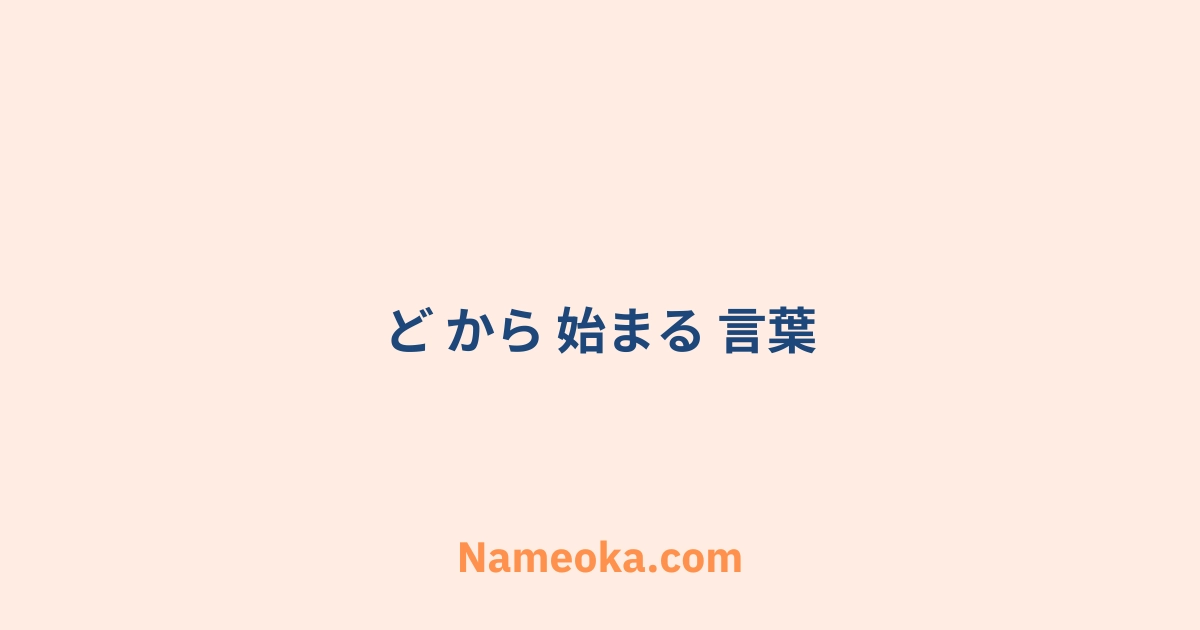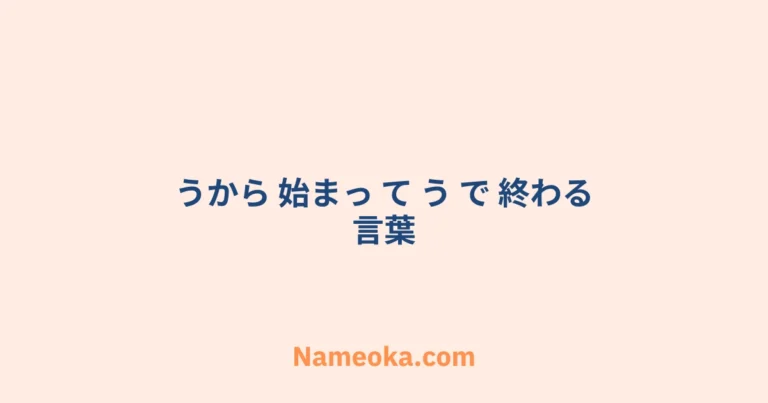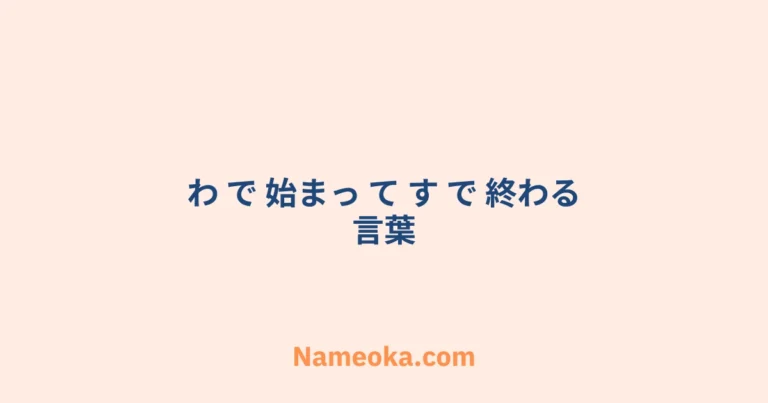日本語の中には沢山の言葉がありますが、その中で「ど から 始まる 言葉」は特に興味深いです。このテーマに注目することで、日常会話や文章作成における新しい視点が得られるかもしれません。どんな場面で使われるのか、どんな意味を持つのかを探ることで、語彙力が深まります。この記事では、ど から 始まる 言葉を通じて日本語の奥深さを紹介していきます。新たな発見とともに語彙の世界を広げてみませんか。.

51+ ど から 始まる 言葉
- 1. ドア
- 2. ドイツ
- 3. 動機
- 4. 動物
- 5. ドラム
- 6. ドラマ
- 7. ドーナツ
- 8. 道路
- 9. 読書
- 10. どんぐり
- 11. ドリル
- 12. ドレス
- 13. どら焼き
- 14. 動力
- 15. 同情
- 16. 動詞
- 17. 洞窟
- 18. 同様
- 19. 同意
- 20. 毒
- 21. 努力
- 22. 道路標識
- 23. どんちゃん騒ぎ
- 24. 毒素
- 25. ドバイ
- 26. 同窓会
- 27. 動揺
- 28. 同盟
- 29. 動機付け
- 30. 動静
- 31. 動線
- 32. 動画
- 33. 同期
- 34. 懂
- 35. 動的
- 36. 銅
- 37. 動作
- 38. 導入
- 39. 脳
- 40. 童話
- 41. 独立
- 42. 同行
- 43. 同志
- 44. 同居
- 45. 洞察
- 46. 動揺
- 47. 動詞
- 48. トップ
- 49. 道
- 50. 同胞
- 51. 独創的
- 52. 同時
ど From A Linguistic Perspective: Origin And Usage
The term “ど” (do) in Japanese holds various linguistic functions and origins, which are interesting from both historical and grammatical perspectives.
Origin
The character “ど” is written in hiragana and is part of the Japanese native script. It is derived from the kanji 度 (used in concept of time, occurrence or degree) and 土 (used historically in native measurements), though in modern Japanese its uses diverge significantly based on the context.
Usage
In modern Japanese, “ど” has several key functions:
- Interrogative Use:
“ど” is frequently used as a prefix to form interrogative pronouns and adverbs. For instance, “どこ” (doko) means “where,” “どう” (dō) means “how,” and “どれ” (dore) means “which.”
Adverbial Usage:
It serves as a part of adverbial expressions, often in formation with the aforementioned interrogatives. For example, “どんな” (donna), which means “what kind/type,” indicates a questioning of characteristics or specifics.
Degree and Extent:
Some expressions of degree or extent like “どれだけ” (dore dake), meaning “how much/how many,” capture the extent or quantity of something.
Colloquial Expressions:
Informal expressions may feature “ど”, such as “どんどん” (dondon), meaning “steadily” or “rapidly,” showing repetition or increase.
Hybrid Constructions:
- Often, “ど” is used in combination with other kanji or elements to create fixed expressions, or collocations, that convey specific meanings not easily derived from the parts individually.
Linguistic Notes
Phonetics: As part of the native syllabary, the pronunciation of “ど” is consistent with the voiced consonant /d/ sound followed by the vowel /o/, providing it a distinct auditory signature in speech.
Contextual Flexibility: The use of “ど” in Japanese language demonstrates the flexibility of native syllables in forming questions and expressing descriptive or quantitative nuances effectively.
Cultural Reflection: Interrogatives with “ど,” reflect the complex structure of inquiry in Japanese language, showing politeness or curiosity embedded in phrase-level constructions.
Overall, “ど” exemplifies how a simple syllable can play a diverse role in communication, reflecting both the rich history and complex structure of the Japanese language. This demonstrates how linguistic elements can evolve and integrate culturally significant ways for expressing both inquiry and description in daily interaction.
Common Expressions And Idioms That Start With ど
Sure! Here are some common Japanese expressions and idioms that start with “ど”:
どんまい (Donmai) – This is a casual expression used to encourage someone not to worry about a mistake or a failure. It’s similar to saying “Don’t worry” or “Never mind” in English.
どきどき (Dokidoki) – An onomatopoeic expression that describes the sound or feeling of a heartbeat, often used when someone is excited or nervous.
どうぞ (Douzo) – A polite way to offer something to someone, like “Here you go” or “Please” in English.
どんどん (Dondon) – An expression that indicates something is progressing rapidly or continuously, like “more and more” or “steadily.”
どちらかというと (Dochira ka to iu to) – This means “if I had to say” or “if anything,” used when giving a slightly more definitive answer.
どうにかなる (Dounika naru) – This means “It’ll work out somehow” or “Things will sort themselves out.”
どちらにしても (Dochira ni shite mo) – Meaning “either way” or “in any case,” it’s used to express that the outcome will be the same regardless of the choices.
どうでもいい (Doudemo ii) – An informal expression meaning “I don’t care” or “Whatever,” indicating indifference.
These expressions are commonly used in conversational Japanese and can add nuance to your communication.
The Cultural Significance Of ど In Japanese Language And Society
The Japanese particle “ど” (do) is a part of the broader linguistic system in the Japanese language known as particles or “joshi.” Unlike other more prominent particles like “は” (wa), “が” (ga), or “を” (wo), “ど” does not stand alone as a particle with a unique function. However, it appears in various words and expressions that hold cultural significance in Japanese society.
Here are some aspects reflecting the cultural significance:
- Question Words:
“ど” is foundational in forming question words, such as “どこ” (doko – where), “どうして” (doushite – why), “どう” (dou – how). These words are crucial for acquiring information and understanding context in communication, reflecting the Japanese attentiveness to detail and context.
Expressing Emotions and Conditions:
“ど” appears in expressions such as “どう” (dou – how), which not only prompt information but also express concern for the listener’s well-being or opinion. This usage aligns with the emphasis on empathy and group harmony (wa) in Japanese culture.
Politeness and Formality:
Forms like “どうぞ” (douzo – please) and “どうも” (doumo – thank you or very) incorporate “ど” and are used frequently in daily interactions to express politeness and gratitude, key elements in Japanese social conduct.
Adaptability and Innovation:
Over time, Japanese language and culture have shown great adaptability, adopting and transforming linguistic elements. The use of “ど” in modern contexts, such as internet slang and popular culture, continues this tradition.
Cultural Expressions:
- “ど” appears in idiomatic expressions and traditional phrases, providing insight into cultural values and teaching societal norms or beliefs. These expressions often reflect historical perspectives and collective values that resonate with contemporary society.
In conclusion, while “ど” as a standalone component might not hold significant cultural weight, its influence permeates through numerous expressions and words that embodies core aspects of Japanese communication style and societal values. Understanding its usage helps appreciate the intricacies and nuances in Japanese language and culture.
よくある質問
ど から 始まる 言葉をいくつか教えてください
どから始まる言葉には、例えば「どれ」、「どう」、「どこ」があります。日常会話でよく使われるものです。.
ど から 始まる 言葉はどのように使われるのですか
どから始まる言葉は、疑問を表すときに多く使われます。また、場所や方法を尋ねる際にも便利です。.
ど から 始まる 言葉の例文を教えてください
例文としては、「ここに来る時間はどれですか」、「どうやってそこに行くのですか」、「あなたの家はどこですか」などがあります。.












